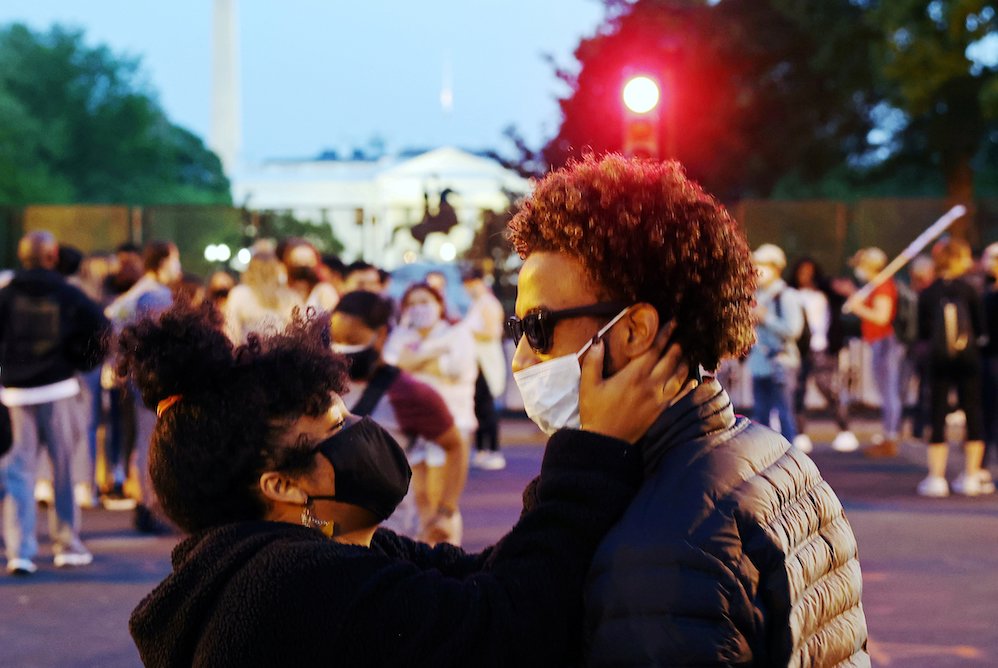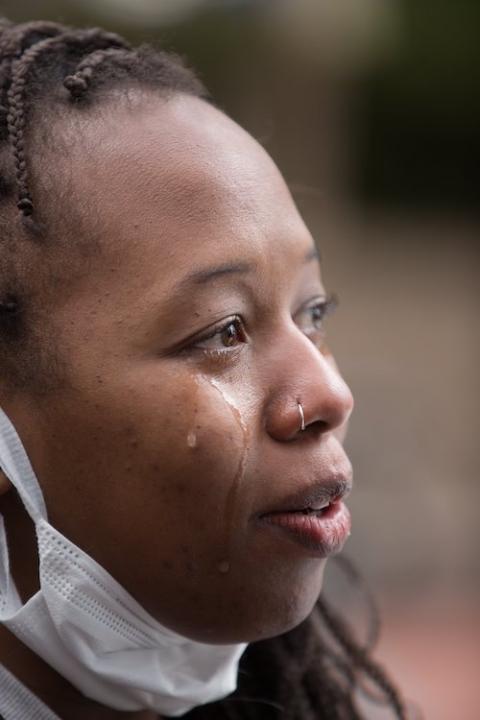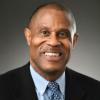
People react at the BLM Plaza in Washington April 20, 2021, after jurors issued their verdict convicting former Minneapolis police officer Derek Chauvin of second-degree unintentional murder, third-degree murder and second-degree manslaughter in the death of Floyd. (CNS/Reuters/Evelyn Hockstein)
Once, while walking on a busy and well-lit street at night, I was abruptly stopped by the police, rudely questioned and roughly searched, under the suspicion that I was the perpetrator of a robbery. I later learned that the only characteristic I shared with the actual criminal was the pigmentation of our skin, he being much younger, shorter and heavier than I. This happened despite my being a priest, a university professor and a respected member of the community (or so I would have thought). The police offered no apology. Nor, to be honest, did I really expect one. Living with such terror and indignity is to be expected. It's part of the deal of being a Black man in America.
I first shared this story publicly over seven years ago when I discussed my reaction to the acquittal of a vigilante neighborhood watchman for the killing of Trayvon Martin. I relate it again now to explain how I felt when I heard the jury's verdict convicting Derek Chauvin for the murder of George Floyd. I felt vindicated.
Vindication. Finally, "a jury of my peers" accepted that Black people have been telling the truth about our experience of policing in America. That we aren't just "playing the race card" when we insist that something is radically wrong about the nation's administration of justice. Finally, at long last, the country faced the ugly truth of the gross injustice perpetrated by law enforcement upon bodies of color in this country. And, at last, firmly and forcefully condemned it.
Yet, this was not a foregone conclusion. When I heard that the jury had reached a decision, my stomach knotted; my heart began to race; I lit candles and prayed anxiously. I was filled with dread. Nor was I alone. It was reported that as news broke that an announcement of the verdict was imminent, offices and parking structures in downtown Minneapolis emptied as white workers fled the city for the safety of the suburbs. Out of fear of a violent reaction, perhaps. But their fear is also an admission of a terrible truth, a tacit acknowledgment on the part of white America that a mountain of overwhelming evidence is no guarantee of justice for Black people. That's the measure of racism in America.
Advertisement
They knew, we all know, all too well that convictions in such situations are exceedingly rare. We need only remember the case of Rodney King, where police officers were acquitted of all wrongdoing for his malicious beating, despite a videotape of the event. And we remember Eric Garner, Tamir Rice and so many other unarmed Black people whose deaths at the hands of the police passed without even an indictment, despite cell phone or other videos of the tragic encounters. Most police officers are never charged for killing people while wearing their badge. And the few who are, are almost always acquitted.
Which raises a discomforting question: Why does it take an excess of overwhelming evidence for justice to prevail? Consider: A pandemic-induced enforced attention. Multiple cell phone recordings. Massive global protests. White participation in Black Lives Matter protests. Tear-filled eyewitnesses. And the testimony of eight police officers. All this was necessary for the country to overcome the presumption that the Black victim was to blame for his death. Because of his noncompliance. Because of his drug use. Because of the size and color of his body (the Black body is itself considered a dangerous weapon and a threat to law enforcement, as asserted in the cases of Rodney King and Michael Brown). This, too, testifies to the depth of racism in America.
Justice prevailed. Thank God! Yet there is no triumph. Only relief. Our dread-filled apprehension and anxiety over the outcome reveal the challenges that remain unresolved.
This is not a moment for celebration, for congratulating ourselves for this small measure of justice too often denied. It's in our country's DNA to want to "turn the page," to put unpleasantness behind us, to move on, to not dwell on the past. After all, the criminal has been tried and convicted. What more needs to be said?
But that would be too easy. Too comfortable. As Martin Luther King Jr. observed during his eulogy for four little Black girls who were killed in a racist attack in Birmingham in 1963, "We must be concerned not merely about who murdered them, but about the system, the way of life, and the philosophy that produced the murderers."
The killing of George Floyd and the jury's verdict are a wake-up call, a summons to white America to examine its fears of people of color that demand accepting unjustified killing as the price of preserving its sense of privilege and entitlement.
Derek Chauvin is guilty of murder. But he is not an anomaly, a rogue agent, an egregious exception, a bad apple. He is a symptom of a more pervasive soul sickness. If we are to move forward as nation, we must examine the way of life that produced a man like him.
We begin with the culture of American policing, which needs systemic rethinking. The Jesuit theologian, Bernard Lonergan, defined culture as the "set of meanings and values that informs a people's way of life." We need to move beyond calls for body cameras, better civilian oversight and enhanced training in conflict de-escalation. Yes, these are important and necessary. But without a thorough revision of the fundamental assumptions and values that undergird our philosophy of policing, future unjustified killings are inevitable.
We need to begin with the assumption that police officers are not warriors, a "thin blue line" protecting innocent (white) people from urban (Black and Brown) menaces. These women and men are social guardians and agents of public safety. Yes, given the force of sin in the world, we must entrust them with the authority to use lethal power. But we must train them to exercise that power as public guardians and only as a last resort. And hold them accountable when our expectations are violated and that power is abused.

Nakami Green of Minneapolis cries April 20, 2021, after former Minneapolis police officer Derek Chauvin was found guilty of second-degree unintentional murder, third-degree murder and second-degree manslaughter in the death of George Floyd. (CNS/The Catholic Spirit/Dave Hrbacek)
We must also train these public agents in how to overcome the unconscious biases against persons of color that are unavoidable as products of American society. We know that one of the major steps in not acting on such biases is being aware of them. Training in implicit bias is absolutely essential for a more just culture of law enforcement.
But focusing on law enforcement alone is again too easy. For police culture does not exist in a vacuum. We must also examine the social values that produce American policing. This means realizing that the country's culture of racially biased policing persists because a majority of white Americans allows it to. Despite the millions of dollars that are paid out every year in civil damages for police misconduct — the family of George Floyd alone has been awarded $27 million — there has never been a sustained commitment to fundamentally rethink American policing. One can only assume this is because the white public not only tolerates it, but endorses it. The multimillion dollar civil verdicts are deemed the necessary price for a specious sense of security.
The killing of George Floyd and the jury's verdict are a wake-up call, a summons to white America to examine its fears of people of color that demand accepting unjustified killing as the price of preserving its sense of privilege and entitlement.
The verdict is also a wake-up call and summons to the Catholic Church to address its complicity in the country's racism. A complicity evidenced in February's Pew Research study showing that less than one third of white congregations heard a sermon or homily about Black Lives Matter as a moral issue this past summer. A complicity manifested by priests who denounced Black Lives Matter protestors as "thugs" and "maggots and parasites." A complicity demonstrated in the often-repeated assertion that the Black Lives Matter movement cannot be supported by Catholics because it "opposes the nuclear family" — overlooking the reality that Black Lives Matter calls for supporting ALL families, not only nuclear ones, for family life in America includes grandparents raising grandchildren and even gay uncles raising their sibling's children. In sum, a complicity demonstrated by the tendency of too many Catholic leaders to privilege the comfort of its white members over the pain and terror of its brothers and sisters of color.
This jury verdict is a summons to the Catholic community to embrace the teaching of Pope Francis, who in discussing George Floyd's killing declared, "We cannot tolerate or turn a blind eye to racism and exclusion in any form and yet claim to defend the sacredness of human life." The challenge for American Catholics is to profess a commitment to anti-racism as an essential dimension of being pro-life.
We must also examine the social values that produce American policing. This means realizing that the country's culture of racially biased policing persists because a majority of white Americans allows it to.
After the jury's verdict, a reporter asked a white man in the crowd outside of the Minneapolis courthouse for his reaction. He thoughtfully replied that he was there because he had "a lot to learning to do myself." He related how Floyd's brutal death "has been a wake-up call for the privilege I have." It forced him, he said, to face facts that he previously avoided and long denied, namely, that his experience of life is fundamentally different from his fellow Black citizens. And this forced him to undertake a very uncomfortable journey. He related that he Googled, "What can a white person do to help out that Black Lives Matter?" When the reporter asked him the answer to that question, he admitted, "I want to find out. I don't know."
I was impressed with man's refusal to rush to premature closure, easy answers and speedy resolutions. He models the kind of self and collective interrogation that the country — and our church — must undertake if we are to transform the culture of racism that compromises our national life together.
I feel relieved and vindicated. But this is not a time for celebration. This month, we witnessed the video of a Black Latino man in Virginia, an Army second lieutenant, who was assaulted and pepper-sprayed by a police officer during a routine traffic stop. Caron Nazario, with upraised and outstretched hands, confessed that he was afraid to get out of his car. The officer yelled, "Yeah, you should be." Nazario, in the course of his assault, objected, "I'm serving this country, and this is how I'm treated?"
Until the nation summons the courage to face Nazario's haunting question, and the resolve to create a nation of "liberty and justice for all," and the existential strength to eradicate the irrational fears that fuel a tolerance for outrageous policing practices, perhaps we can be relieved at Derek Chauvin's conviction. But we dare not celebrate as we anxiously stumble from crisis to crisis, and wait in dread for another jury's decision.








